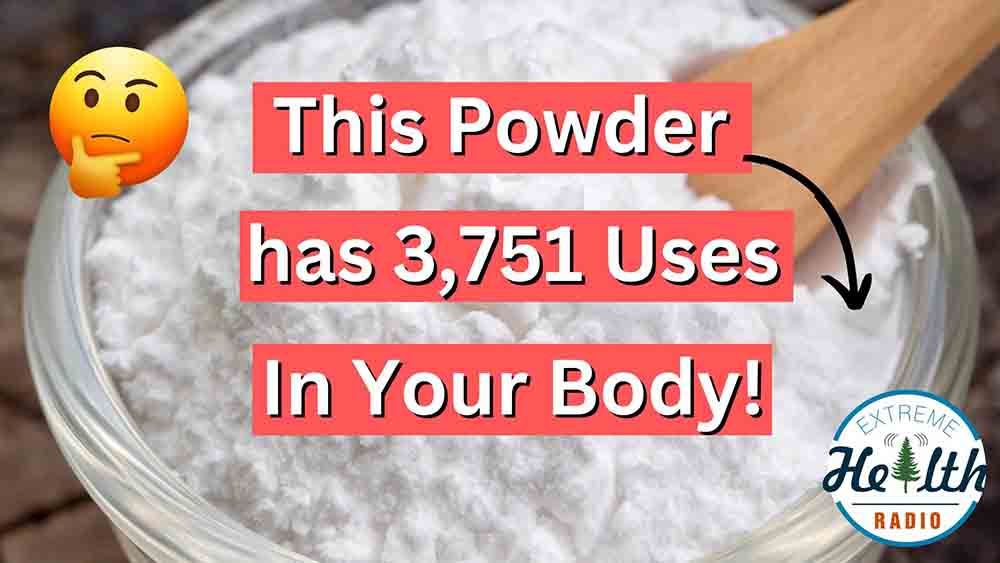
People ask me quite often, “if there were only one supplement you could to take, which one would it be?”
My answer would be…
Hands down magnesium because of its benefits to our bodies but also because of how many biological processes require it.
I’ll get into that in a bit and I’ll cite some good studies that you can look further into if you’d like.
Some people in the alternative health movement give lip service to magnesium without really emphasizing just how critical and necessary it is for biological life to function.
It kind of bothers me actually because what a lot of popular influencers will say is that “magnesium helps you to relax” or “magnesium can help you feel calm and fall asleep faster“.
I feel like this is such an insult to magnesium.
I think we owe a collective apology to this foundational mineral.
Magnesium bisglycinate benefits the body in so many ways that most people don’t know. I’m excited to share about all the benefits of this mineral to you in this article.
I didn’t really fully understand just how important magnesium is until I dove deeper into the work of Morley Robbins. He was known as the magnesium man and he’s the author of the book Cure Your Fatigue. We’ve done many interviews with him over the years but I’ll post just one of them below that has some good information about magnesium in it.
I’ve been taking magnesium bisglycinate for around 10 years now consistently. I used to take it off and on and was never really strict about my intake of it.
The level of health I’ve been able to attain as a result has been pretty remarkable to say the least.
First let’s talk about magnesium glycinate vs bisglycinate.
Magnesium Glycinate vs Bisglycinate
Magnesium glycinate is where a single molecule of magnesium is chelated or bound to one amino acid of glycine.
Magnesium bisglycinate just means two. So a single molecule of magnesium is chelated to two amino acids of glycine. This makes magensium bisgylicnate chemically more stable and also much easier on your small and large intestine. In other words, it won’t give you the runs. 😉
On top of being more able to be digested much easier, it’s also able to be absorbed and get into the cell easier. Better absorption of magnesium means more health benefits.
With that said there are many forms of magnesium like…
- Magnesium Glycinate / Bisglycinate
- Magnesium Lysinate
- Magnesium Taurate
- Magnesium Aspartate
- Magnesium Glutamate
- Magnesium Orotate
- Magnesium Threonate
- Magnesium Malate
- Magnesium Citrate
- Magnesium Oxide
- Magnesium Chloride
- Magnesium Sulfate (Epsom Salt)
- Magnesium Carbonate
- Magnesium Hydroxide
- Magnesium Lactate
- Magnesium Phosphate
- Magnesium Pidolate
- Magnesium Acetate
- Magnesium Fumarate
- Magnesium Glycerophosphate
- Magnesium L-Aspartate
- Magnesium Bis-L-Aspartate
- Magnesium Succinate
- Magnesium Gluconate
- Magnesium Stearate (mainly used as a filler or stabilizer in supplements)
Most of these I don’t use. I only use a handful of forms that give me all the benefits.
Top 9 Magnesium Bisglycinate Benefits
Bone Health
Magnesium intake is correlated with higher bone density, which is achieved through increased bone-building activity and decreased bone-degrading activity. It also limits the size of hydroxyapatite crystals, leading to improved bone stiffness.
There was a study conducted by E. Brilli et al. in 2018 comparing the bioavailability of different magnesium forms, where magnesium bisglycinate showed significantly higher absorption in red blood cells, suggesting potential benefits for bone health. – Source
M.E. Pickering conducted a study in 2021 on magnesium’s role in bone density and found that magnesium bisglycinate supplementation could help prevent osteoporosis. – Source
Reduced Risk of Hypertension
High magnesium intake from food sources, including magnesium bisglycinate, has been associated with a lower risk of developing high blood pressure.
In 2018, E. Brilli et al. carried out an interesting study to evaluate the effect of magnesium bisglycinate on patients with hypertension and found that it significantly improved magnesium absorption, which is beneficial for managing hypertension. – Source
A study by G. Piuri et al. in 2021 gave 300 mg of magnesium bisglycinate for 12 weeks to patients with mild hypertension, showing a consistent reduction in blood pressure. – Source
Improved Insulin Sensitivity
Oral supplementation with magnesium, including bisglycinate, can improve insulin sensitivity and blood glucose control in individuals with type II diabetes and those who are overweight or have insulin resistance.
In a 2021 study by G. Piuri et al., magnesium bisglycinate was shown to improve insulin sensitivity and reduce insulin resistance in patients with metabolic syndrome and type 2 diabetes. – Source
A 2018 study by C.A. McGarry revealed that dietary magnesium bisglycinate supplementation significantly enhanced insulin sensitivity and glucose metabolism in diabetic subjects. – Source
Essential Metabolic Reactions
Magnesium is involved in over 3,751 essential metabolic reactions in the body.
In 2018, E. Brilli et al. conducted a study showing that magnesium bisglycinate played a role in various biological reactions, including those involved in metabolic syndrome and diabetes, by enhancing metabolic processes. – Source
A 2016 study by M. Bangratz et al. showed that magnesium bisglycinate is involved in many biochemical reactions, supporting energy metabolism and other metabolic pathways in the body. – Source
Control of Sugar Cravings
Magnesium helps in controlling sugar cravings, which can be beneficial for maintaining a healthy diet.
In a 2021 case study from the IFN Academy, a patient taking 200 mg of magnesium bisglycinate daily experienced reduced sugar cravings and improved energy levels after three months. – Source
A study by K. James in 2018 suggested that magnesium bisglycinate supplementation could help curb sugar cravings by stabilizing blood glucose levels and reducing stress-induced cravings. – Source
Heart Health
Magnesium is essential for heart health, helping to maintain a regular heartbeat and prevent cardiovascular diseases.
In a 2020 study, A.K. Vynckier et al. found that magnesium bisglycinate improved calcium homeostasis and reduced vascular resistance, contributing positively to cardiovascular health. – Source
G. Piuri et al. conducted a study in 2021 showing that magnesium bisglycinate supplementation was associated with lower vascular resistance and improved cardiac function, suggesting benefits for cardiovascular health. – Source
Muscle Function
Magnesium plays a crucial role in muscle function, including muscle relaxation and contraction.
In 2020, A.K. Vynckier et al. evaluated magnesium bisglycinate’s effects on muscle function and found it supported muscle contraction and energy metabolism due to its high bioavailability. – Source
A 2021 study by C. Molinari et al. revealed that magnesium bisglycinate supplementation improved muscle cell relaxation and function when combined with vitamin D3, supporting overall muscle health. – Source
Nervous System Support
Magnesium supports the nervous system, helping to reduce symptoms of anxiety and depression.
In 2021, R. Capanna-Hodge conducted a study showing that magnesium bisglycinate supplementation helps calm the nervous system and supports sensory balance in individuals with autism. – Source
A study by OMN Book in 2021 demonstrated that magnesium bisglycinate, when combined with other calming herbs, improved sleep and decreased nervous system hyperactivity in patients. – Source
Cancer
Magnesium may be helpful for cancer patients. Magnesium deficiency would also be related to getting cancer in the first place.
In 2015, J. Green et al. conducted a study on magnesium bisglycinate supplementation in cancer patients receiving chemotherapy, which showed that it helped reduce symptoms of muscle cramps and neuropathy. – Source
A 2012 study by P. Ferrari et al. compared ferrous bisglycinate and ferrous sulfate in cancer patients with non-chemotherapy-induced anemia, finding that bisglycinate was more effective and had fewer gastrointestinal side effects. – Source
Other Benefits of Magnesium
Magnesium is required for not 300 biological functions like most health influencers will tell you but actually 3,751 processes. You have 9,000 enzymes so that’s roughly 42% of your entire metabolic engine, requires magnesium just to function.
Magnesium is also the first mineral lost when we are stressed. We are living in a very stressful culture today unlike any other. These stresses on the body could be from…
- Food
- Air
- Indoor chemicals
- Plastics
- Relationships
- Career
- Family
- Injury, sickness or illness
- Water
- Financial
- Etc
We’re living in incredibly stressful times. The more stress we’re under, the more magnesium we require.
In addition to stress magnesium is necessary for
- Conversion of inactive thyroid hormone T4 to T3 in your liver
- Conversion of UVB to 7-dehydrocholesterol to lumisterol, toxipherol, Calcidiol, Calcitriol, all the way to 1,25 active vitamin d (which then turns on/off over 1,500 genetic expressions)
- Chelating heavy metals
- Creating ATP (adenosine triphosphate…energy) in complex 4 cytochrome c-oxidase in your mitochondria
- Digestion
- Creation of bile
- Creation of hydrochloric acid to break down food
- Activating your lymphatic and glymphatic system
- Activating enzyme production
- Donating electrons
- Reducing oxidative stress
- Synthesizes key proteins
- Modulates your nervous system
- Required for bone health osteoclasts and osteoblast regulation
- Muscle contractions
- Balancing electrolytes
- Regulating blood and tissue pH
- Stabilizes RNA and DNA
- Allows for better cell signaling
- Protects cell membranes
- Activates key antioxidants like glutathione and super oxide dismutase (SOD)
- Strengthens mitochondrial function and growth
- Regulates blood glucose
- Detoxifies heavy metals
- Balances calcium
- Regulates enzymes required for blood clotting
- Oversees cell transport (like allowing calcium & potassium ions) to get inside the cell or not
- And thousands more.
Without magnesium you’d be dead. It’s the number one mineral you need to be taking daily just to deal with the stressors of modern living.
How I Take Magnesium
I like to take magnesium in a number of ways each day. You can only take so much magnesium orally in supplement or pill form without getting diarrhea or cramps and bloating. The other ways I sneak it in is topically.
If I take a bath, I always add magnesium bath salts to it along with baking soda and boron.
Twice per day I like to rub magnesium oil onto my skin.
I’ll get it from foods like Spinach, Pumpkin Seeds, Almonds, Cashews, Black Beans, Dark Chocolate, Avocado, Quinoa. I most like to eat avocados and chocolate daily. 🙂
I also add a little bit of magnesium powder to my water. Generally I’ll switch between a magnesium glycinate powder or Remag.
I like transdermal magnesium because it completely bypasses your gut and digestive system. So there’s no upper limit with doing transdermal magnesium.
If you really wanted to go all the way you could do a rapid magnesium push, this is different than a magnesium IV (although really great to do as well). But the magnesium push forces magnesium inside the cell where its concentration should be 16x greater than outside the cell. This will then re-activate the “magnesium pump” that gets deactivated from magnesium deficiency.
Some people will buy a magnesium float tank and get transdermal magnesium that way. That’s expensive costing thousands of dollars for the equipment.
I’d rather just add it to my water and take some supplements daily.
Magnesium FAQs
Can you take too much magnesium?
Yes you can. If you start having the “runs” or loose stools back off and start slowly. There is something called “the magnesium induced magnesium deficiency syndrome” where taking too much magnesium can actually deplete your magnesium by causing you to lose minerals with the diarrhea.
Can I get enough magnesium from food?
Maybe a long time ago when soils were filled with minerals like magnesium and copper that could have been possible. But we know that our soils have been depleted in the United States since the 1930s. On top of that we’re living in stressful times which increases magnesium requirements.
I recommend supplementing magnesium bisglycinate daily.
Are there side effects of taking magnesium?
Upset stomach is the number one complaint I get. Digestion returns to normal as soon as you ease off the amount of magnesium you’re taking.
Conclusion
Like I mentioned above magnesium bisglycinate benefits the body in 3,751 ways! At least start supplementing it and then see how you can work it into your daily health routine. If you drink water, add a little bit of magnesium to your water, if you take baths, add some magnesium salt to it. Start slow but get it into your diet daily!
You’ll be glad you did because the health benefits of magnesium are endless.
Questions
- What’s your magnesium discipline like?
- How do you like to take magnesium
- How much do you take and how long have you been taking it?
- What results have you notices?
I’d love to know!
Comment below.


